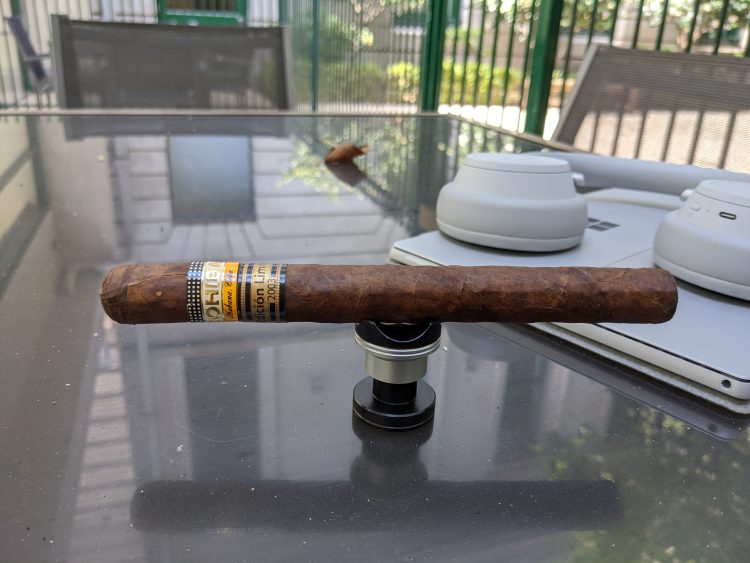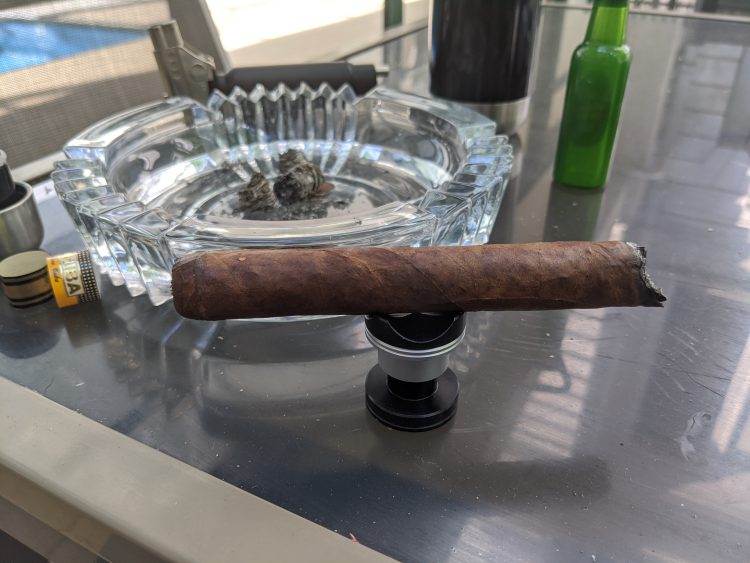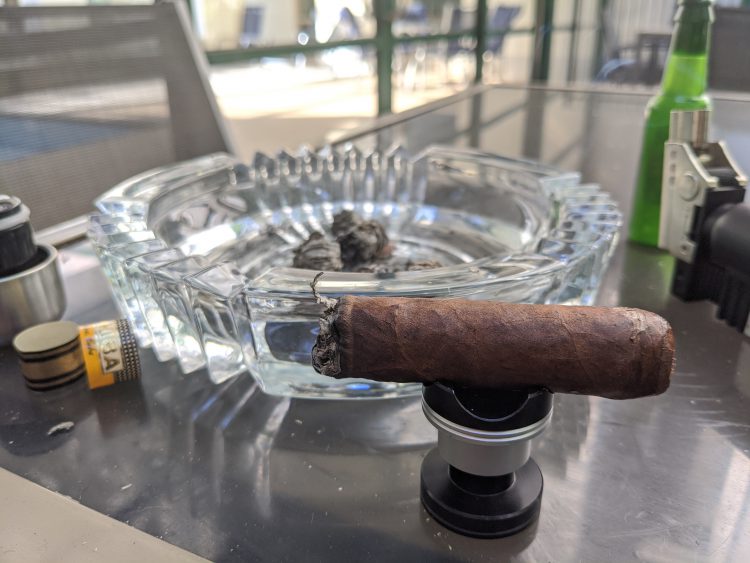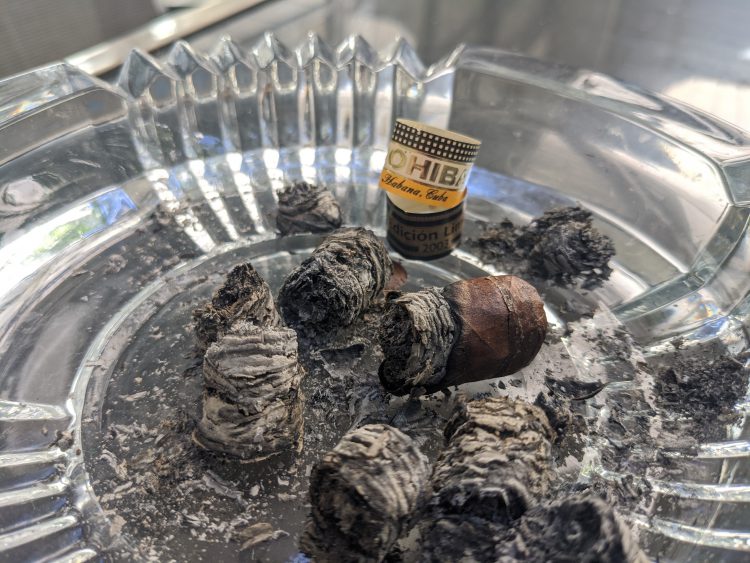My first Cohiba Double Corona in 2006 was a revelation. At that point in time, my cigar experience was just starting to peak out of the mainstream. I had had plenty of Monte 3s and 4s and Romeo 1s and 2s. I was starting to dabble in Bolivar Belicosos Finos and the odd Punch Punch. On special occasions, I had had one or two of the smaller Cohibas, and a Romeo Churchill and some of the other trophy cigars. The Cohiba DC, though, was my first Limited, and my first true luxury cigar. It blew everything that had come before it away by the widest of margins. It was the cigar that showed me what a cigar could be.
In 2020, the DC is still a magnificent thing to behold. Its 49 ring is thick enough that it has some weight to it, but not so fat that it loses all elegance. At 194mm, the proportions make a statement. The wrapper is dark and oily. The construction perfect.

Set ablaze, the cigar begins wonderfully. It is smooth and rich, with a hint of charred oak barrel with an earthy umami mushroom note. Light to mid-tobacco strength.
I cannot smoke a DC without my mind drifting back to that first afternoon and to the friend who I enjoyed it with. Bertie, sadly, is long lost to me now, but in those heady days he and I were the closest of companions. (incidentally, Bertie is one of the prime suspects as The Wolf That Walks Among Us, for reasons which will become clear).
Bertie was one of those friends that you occasionally have to explain your friendship with. His father was a musician who’d recorded a hit song in the mid-1980s, that is still popular in Australian commercials to this day. The royalties from that one track had given his family the comfortable middle-class life that is out of reach of most with a career in entertainment, and especially not those who have been semi-retired since their 30s.
Much of my friendship with Bertie stemmed from our shared love of the finer things; of whisky and wine and Havana cigars. I’ve always felt my thirst for life was greater than most of my contemporaries, but Bertie’s was far less slakeable than mine. Bertie was always the last one to leave the party. He was always up for anything anytime you called him. He had little regard for money, and would charge into an evening of excess without any thought to whether he was spending his first dollar or his last.
Bertie and I would often meet for a cigar at ten or eleven in the evening, and heading home at two or three would stop off at a fast food place for a late-night snack. I would order a small fries, or maybe a cheeseburger – just some little thing to stop my stomach grumbling while I was trying to fall asleep. Bertie was a gourmand, in the truest sense of the word. He would order the double bacon cheese extreme mega meal, or whatever was the largest thing on the menu. He approached all his meals and frequent snacks with the same gusto, a habit which was reflected in his generous proportions.
Bertie was weird around girls. More than once I had to spend the morning after the night before on the phones, doing damage control to patch up some offence he had committed. His party piece was that he had a Prince Albert piercing, and no compunctions at all about showing it to people. Most of the time, it was met with a bemused “didn’t that hurt,” followed shortly thereafter by someone reporting to me that my friend was drunk and should be put in a cab. My favourite memory of his performance is of a time when he showed it to a small group, including a French exchange student someone had brought along. The student pointed to a freckle on Bertie’s head and loudly exclaimed “what’s this? Your penis is dirty! It’s dirty!”
“Fuck off, it’s a freckle!” Bertie protested, hurriedly shoving it back in his pants.
Bertie fell in love often and hard, and would lavish the objects of his affection with expensive gifts, far more than he could afford or was warranted by the relationship. Girls who went out with Bertie would find themselves presented with jewellery or another pricy item as early as the second date. On one occasion, an inamorata of his left for a three week vacation the day after a promising first evening out with Bertie. Without so much as an email exchanged in the interim, she found him waiting for her at the Arrivals Gate with flowers upon her return. Each inevitable rejection would plunge Bertie into a deep depression, which generally led to ever pricier items, deposited anonymously on his paramour’s doorstep. Over the years, a small cluster of star tattoos grew on his calf, in blues and greens and browns. He would never explain them, responding to questioning with an evasive “those are just for me,” but I’ve long held the theory that each one represented an unrequired love with the colour of her eyes.
Above all, Bertie liked to be entertained. His room at his parent’s house was dominated by the dual monoliths of his giant TV and his video-gaming rig. He had a huge collection of DVDs, and was the kind of guy who bought the collector’s edition boxed set with the special tin and the hand-painted figurine. His career aspirations extended vaguely to “something in entertainment,” but he never showed much creative energy. The guy just liked to watch movies.

At the mid-point the Cohiba Double Corona is sweet and nutty: sugared almonds. The strength has thickened to a firm medium. The aftertaste leaves me a little dry, with something of a light roast espresso note. It is impeccable.
After high school, Bertie had gone to university like the rest of us, but where we had undertaken technical degrees, Bertie had begun some vaguely defined Cinema Studies qualification. He liked the movies, but the essays were a bit much, and he dropped out at the end of the first year to work part-time in a video shop.
As we entered our mid-twenties, Bertie’s peers were finishing our matriculations and beginning our adult lives. Many of us set off on adventures. I went to Japan, and later China. Buckley went to Japan as well, and Davidé joined the army and deployed to the Middle East. Other friends started jobs, wearing suits and scrabbling for the bottom rung of the corporate ladder. Some of them met girls, and later got married. People moved out of their parents’ homes, first to dirty share houses with friends, and later to a small-apartments. A few even talked about buying a place.
But not Bertie. At twenty-seven, during the last summer of my youth, when I had returned from my life as a highly-paid expat in China, with enough cash for a house deposit and an enviable resume, Bertie was in much the same position as he had been at nineteen. He lived with his parents. He worked at a video store. He played a lot of video games. He had mostly graduated from DVDs to Blu-rays. Sometimes he chased girls, each to the same grim conclusions as ever.
I lived as large as seemed prudent within my means, which in those days meant a box of cigars every month or so, and a couple of nights a week at cocktail bars. Bertie had a third my income and lot more incentive to save, but lived far larger. On his days off he would sometimes spend the whole afternoon in Baranows, paying bar prices for three cigars and seven top-shelf rums. Most nights after work you would find him propping up the bar at the cocktail place across the road. I met him there a few times. He drank heavily and tipped generously.
The video store Bertie worked in was a family affair that specialised in niche and cult titles. Of the five casual staff, Bertie was the most senior (by seven years, as well as in authority). Officially he was just another clerk, but he functioned as something between the assistant manager and the boss’s son. It was Bertie who was charged with doing the count at the end of each night, and with running the cash down to the bank in the morning. When the boss was away, Bertie looked after his house, and might pick up his kids from school or some other favour when he was in a pinch.
Eventually, it all came out. Buckley and I were in my parent’s back yard, enjoying some discount sodas from NQR, when Bertie called me up and asked if he could join us. He had something to confess.
It had started simply enough, as it always does. Bertie’s workplace had had a promotion, and papered the neighbourhood with flyers offering two-for-one DVD rental. When a customer came in with a coupon, the clerk would input the sale at half price, and then stamp their flyer and add it to a spike. Under the counter sat a stack of the unvalidated flyers to hand to the customer for use on their next visit. Bertie was quick to recognize the flaw in the system. Whenever a customer made a rental without bringing in a coupon, he simply charged them full price, took a flyer from the stack for the spike, and pocketed the difference. Over a shift, it might be twenty or fifty dollars: not much, but it covered the first round at the bar.
When the promotion ended, Bertie had another realisation: from time to time, a customer would come in complaining about a DVD that wouldn’t play. In that case, the clerk had discretion to put the sale through with a defect code, and the customer would get their next rental for free. A few times a night when a customer paid cash, Bertie would scan it through as defect and pocket the difference. It was only fifty or a hundred a night, but it covered the first few rounds at the bar, and maybe a cigar afterward.
It all came undone when Bertie switched shifts. Most of the time he worked Tuesday to Saturday, but on this particular week he had swapped a Sunday with someone. Sundays were a quiet night in any week, with a usual take of around $700. When Bertie locked up at the end of his shift, he had $500 in cash in his pocket. The boss had noticed a general decline in revenue for months, but had put it down to the slow death of an industry that was well into its twilight years. When he checked the safe on Monday morning and found an eighty percent drop on the previous week, he finally went to the computer.
On Tuesday morning when Bertie arrived, his boss hustled him straight into the back room, and showed him the defect code statistics. Over the past six months, defects had increased a hundred-fold. Ninety-nine percent of them had been scanned in by Bertie. With panic in his eyes, Bertie began to stammer something about how sometimes they left the computer logged in and other staff might use it, but when the boss pointed to the take on the Sunday when Bertie had worked, verses every previous one when he hadn’t, Bertie broke down. With tears running down his face, he confessed all and begged forgiveness, blaming a drug addiction. When the boss asked Bertie how much he had stolen, Bertie estimated it at ten-grand, but the reality was that neither man had any idea of the actual figure.
Undecided on whether or not he should involve the police, the boss sent Bertie home. When he walked in the door, his mother was sitting at the kitchen island, doing the crossword. She barely got out her “you’re home early,” before the whole story cascaded from Bertie.
His confession over, Bertie’s mother got up and went straight to the bank. She withdrew ten thousand in cash, and took it to the video store.
For the next few weeks, Bertie’s old boss would call him up from time to time, mostly demanding the return of some trinket or other that Bertie had borrowed over the years, or to accuse him of taking something that was misplaced around his house, and threatening still to involve the police. Eventually he stopped. Caught in the collateral damage was one of Bertie’s friends, who had gotten a job at the video store based on Bertie’s recommendation. The boss let him go with a small redundancy. He said he was sorry, but he just couldn’t trust him anymore.
Bertie confessed all this to us in the hope, I suppose, that we would be sympathetic, and support him through his personal crisis. The products of a single sex education, we of course drilled him about it relentlessly.
In the end, it was a formative moment for Bertie. Within five months, he had sold most of his DVD boxed sets, pawned his giant TV, and left for Hollywood. Nearly a decade has passed, and he has yet to return. He’s not a big success, but I think he does okay. A commercial here and there, or a minor role in something-or-other. Enough to pay the bills, which is more than most can say for a career in entertainment.

In the final third the Double Corona gets heavy, with the roasted, chocolatey bitterness of slightly burnt, walnut-heavy brownies. It is not acrid in any way, and remains smooth and beautiful, all the way to the nub.
There is little more that can be asked of a cigar than this. It is a magnificent smoke. At least on par with the Robustos Supremos.

Cohiba Double Coronas Edición Limitada 2003 on the Cuban Cigar Website.